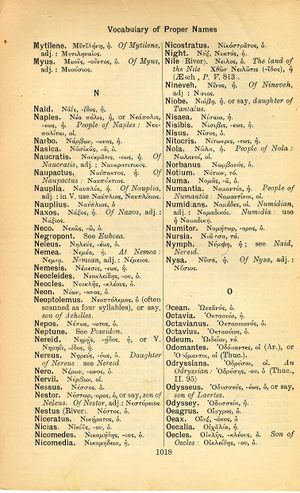Naxos
Ἔστιν τὸ τολμᾶν, ὦ φίλ', ἀνδρὸς οὐ σοφοῦ → Amice, non sapientis es res temeritas → Leichtsinn, mein Freund, passt nicht zu einem weisen Mann
English > Greek (Woodhouse)
Νάξος, ἡ.
Of Naxos, adj.: Νάξιος.
Latin > English (Lewis & Short)
Naxos: i, f., = Νάξος,
I the isle of Naxos (now Naxia, or Axia), in the Ægean Sea, the largest of the Cyclades, famed for its wines, and for the abandonment there of Ariadne by Theseus, Plin. 4, 12, 22, § 67; Verg. A. 3, 125; Ov. M. 3, 640; Prop. 3, 17 (4, 16), 27.— Hence, Naxĭus, a, um, adj., Naxian: turba, Prop. 3, 17 (4, 16), 28: juncus, Plin. 21, 18, 69, § 115: ardor, Ariadne's crown, a constellation, Col. 10, 52: cos, = Ναξία ἀκόνη, a whetstone from Naxos, Plin. 36, 22, 47, § 164. —Subst.: naxĭum, ii, n., a Naxian whetstone, Plin. 36, 7, 10, § 54; 37, 8, 32, § 109.—
II An ancient city of Sicily, destroyed by Dionysius. On or near its site Tauromenium was built, Plin. 3, 8, 14, § 88.
Latin > French (Gaffiot 2016)
Naxos ou Naxus, ī, f. (Νάξος), Naxos [île de la mer Égée, la plus grande des Cyclades : Virg. En. 3, 125

